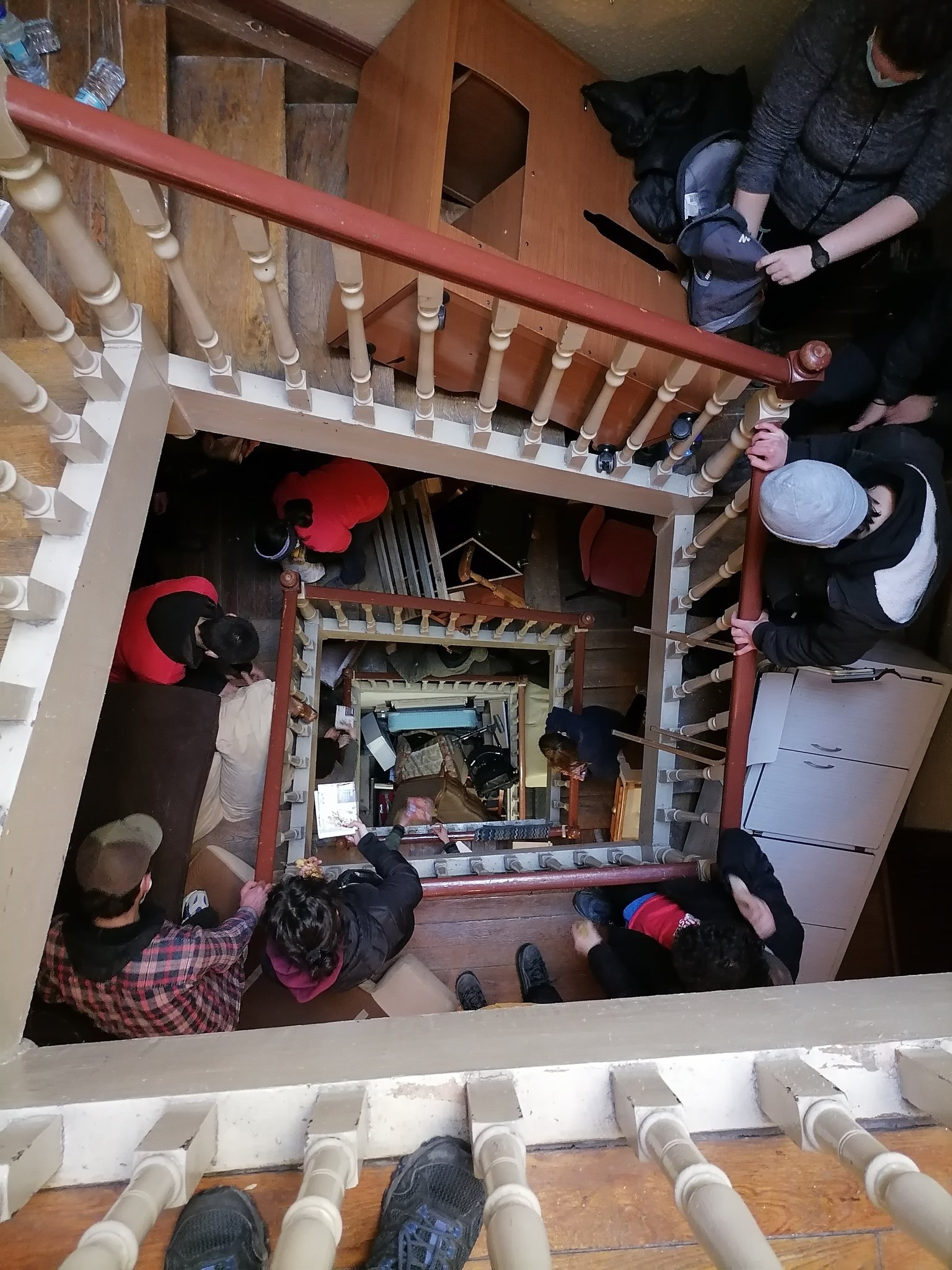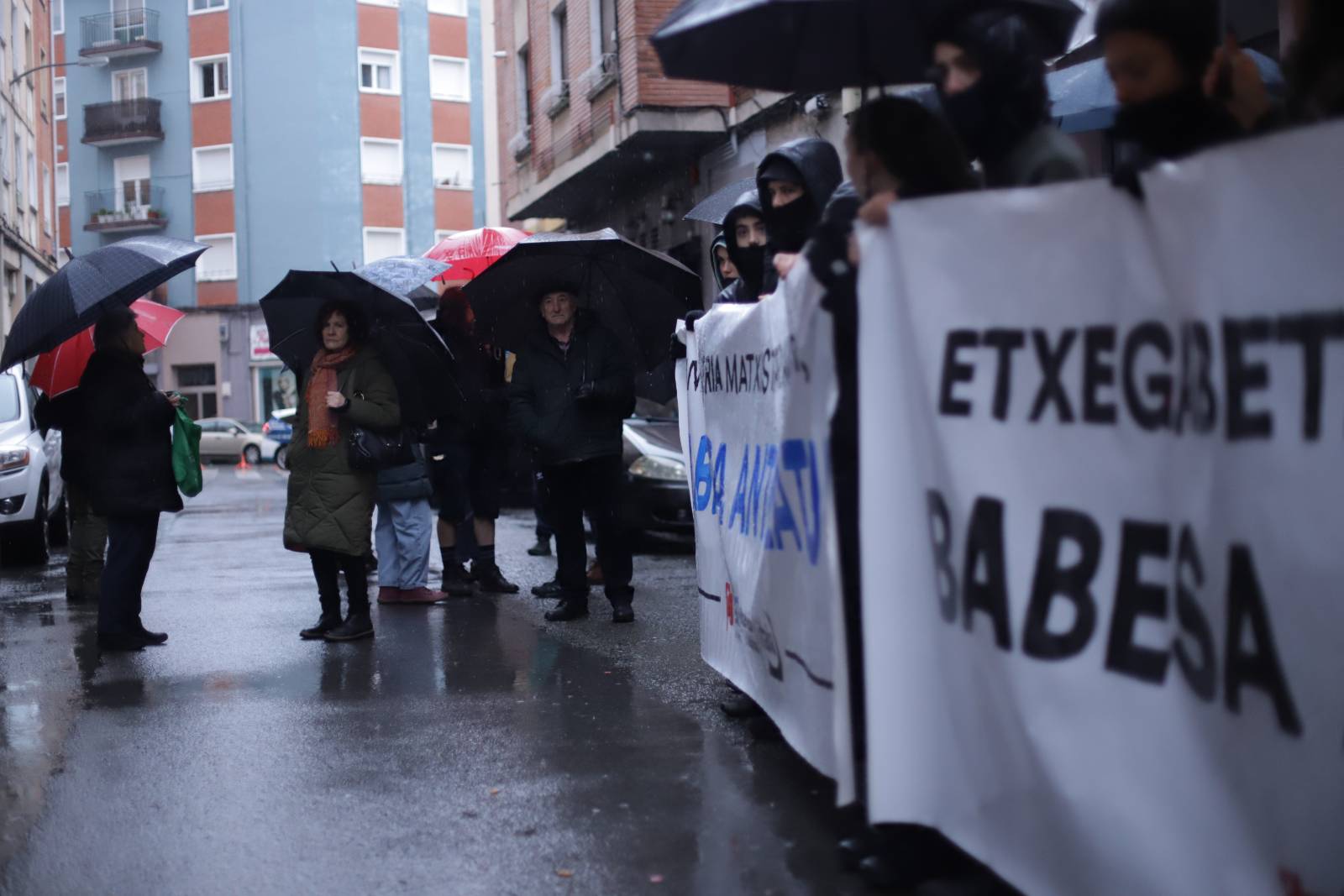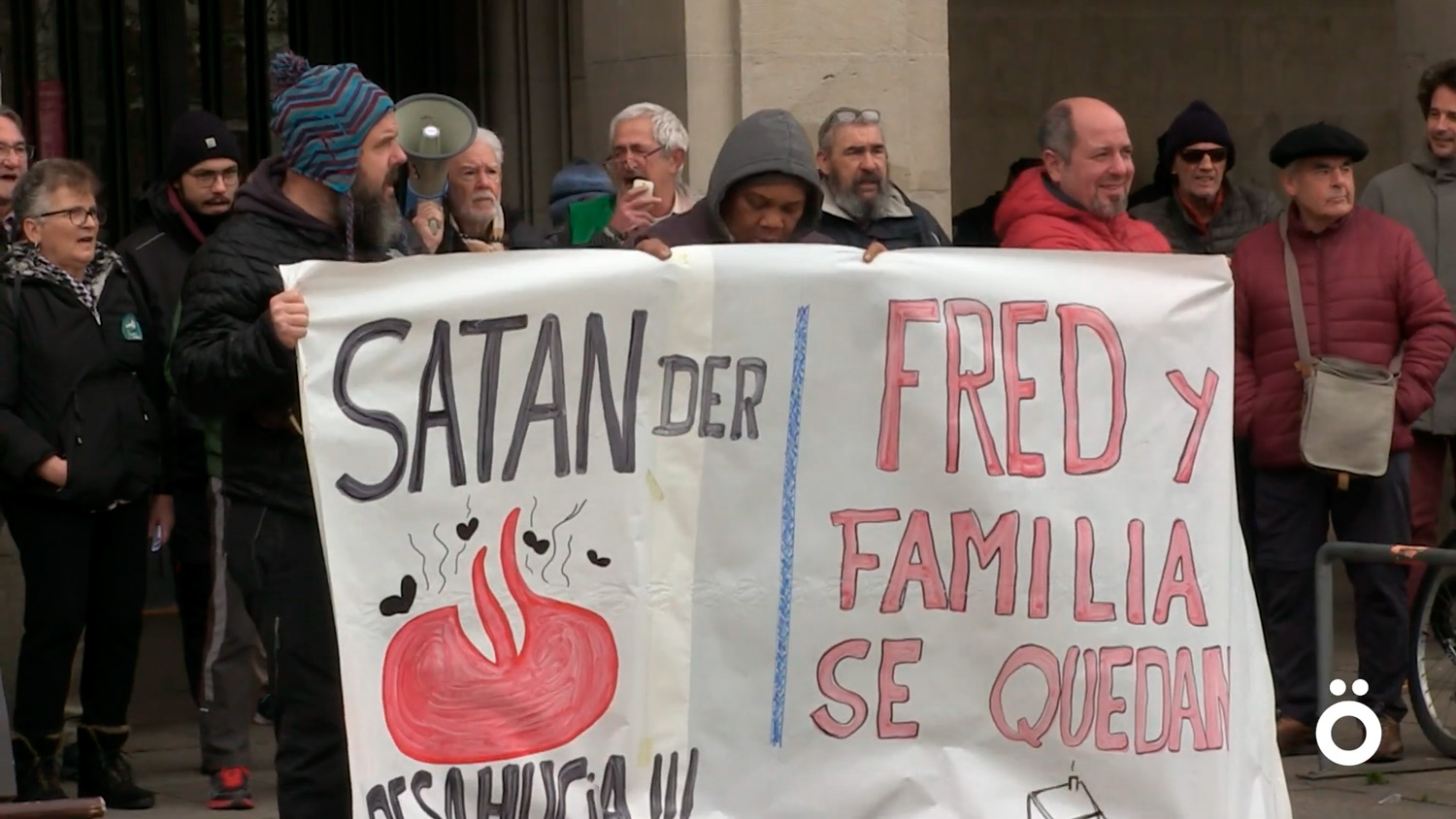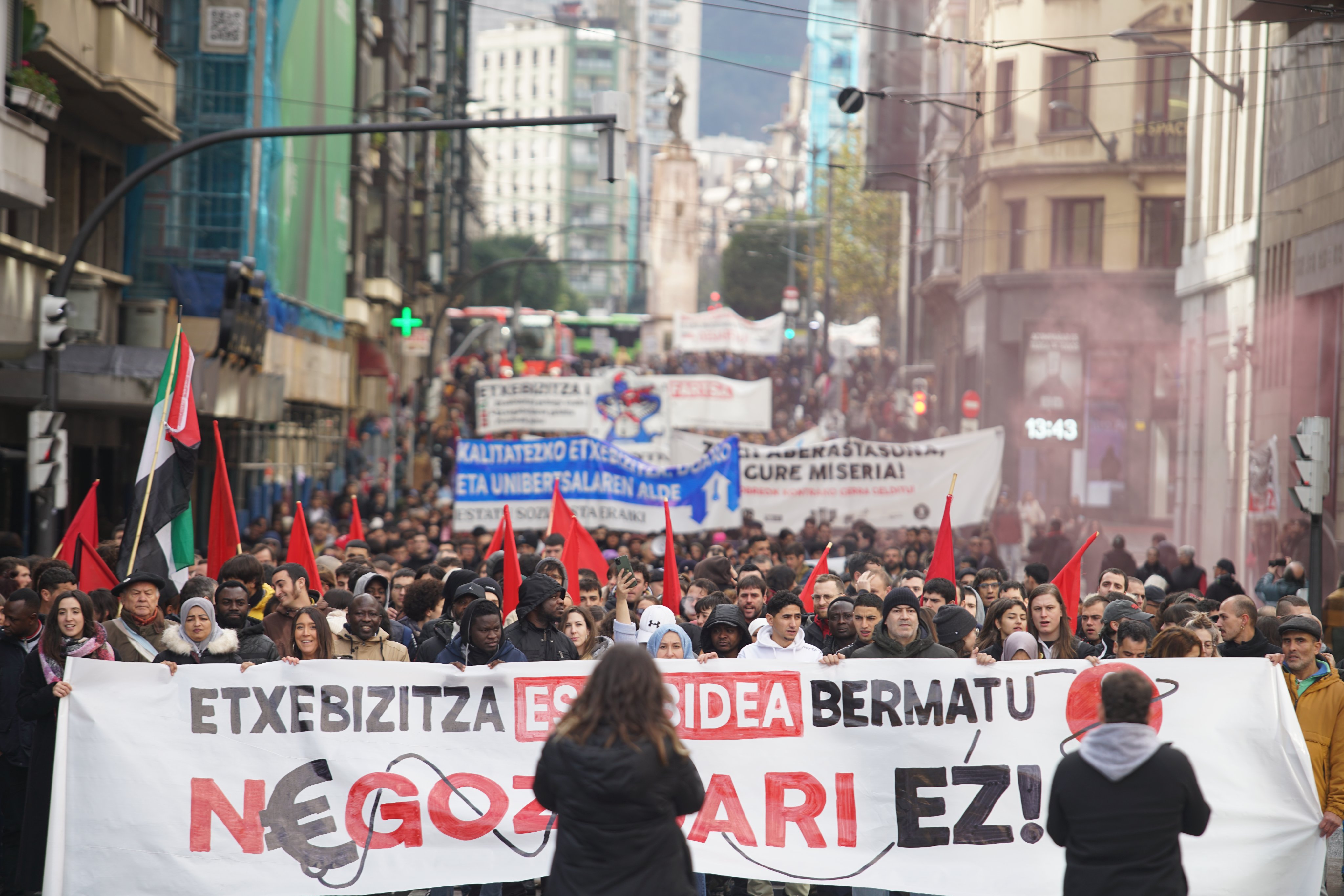How to Recover Apartments from Big Owners for Citizenship
- “You can vote in Berlin on the law to take away thousands of weight from the big owners,” said this medium in February of this year. In order to deal with the increase in housing, a taboo has been broken in German public opinion: the holding of a referendum to return the houses of the large owners to public property is on the table. The citizens' drive has managed to generate a debate on the need for policies that return a privatised space to the majority.

Andrej Holm (Leipzig, 1970) is a sociologist and professor at the University of Humboldt. Expert in urbanism and gentrification, was appointed secretary of housing of the City Council of Berlin in 2016. Shortly afterwards, due to political pressures, Stasin was expelled from the City Hall and the university. The students of Sociology reaccepted the faculty after a month of occupation. Currently, he also acts as an advisor to the housing area of the City Hall. We have talked with him about the situation in the real estate sector in Berlin and about the potential that the draft referendum can have.
Berlin has been growing as a city for years. At an unusual speed. Are properties the new gold?
That's right. Since 2009, after the financial crisis, the turnover of real estate companies has increased from six billion to twenty billion in Berlin. It's tripled. And it's not particularly the amount of real estate, it's the price of the existing ones. In the real estate sector, the term “beton gold” is used. Investment in veto. This has another political consequence in Berlin: increasing the value of the whole city; and it has profound consequences in a rented city like Berlin.
A lot of money and investment is coming into the city. Gentrification has become one of the main problems. To what extent does it influence the lives of neighbours?
In the 1990s and 2000s, gentrification was considered a neighborhood problem. We discussed which neighborhood was produced or not, and we saw that the expulsion of the neighbors occurred because rentals and the cost of living were elevated to other neighborhoods. Since 2012, it is clear that the rise in rent prices cannot be limited to a few neighbourhoods and has spread throughout the city. The expulsion process encompasses the entire urban district and has spread to part of the province. There is no place where you can say “this is cheap, the poor can come here.” In the situation that our studies come up, the rent is rising and people are too poor to be expelled. They can't afford the move. The consequence is that the neighbours reject the expulsion process and defend their own homes.
On the other hand, those who have the least money with gentrification are always the most hit when renting. If half or 60 percent of the salary is for housing, there's less money to be with friends, to buy food, for school books or for holidays. At the same time, people work harder, taking two or three jobs, to pay rent, not to improve life. The other side of the gentrification process is the elimination or decline in living standards: the most visible indicator in neighborhoods is the disappearance of small shops or trade. They have less protection mechanisms than their neighbors. In search of benefits, the owners of these premises can more easily cut the contract to sellers who sell products at a low price in their shop. Then come the well-known chains like Starbucks or the widespread hospitality. Neighbors no longer have room to buy cheap or meet.

Evictions are one of the hardest consequences of gentrification. There are also many in Berlin. Why has it not been possible to have debates or struggles against them in the city?
Well, in Berlin the numbers are lower than in Barcelona. However, we have many evictions every year, 7,000 or 8,000. We had about 23 of them every day. They've gone down since 2015, and we now have a dozen in a city of three and a half million people. It is dramatic for those affected, but it is not seen as the main problem. The main problem for most is the rise in rental prices. And the most obvious consequence is that you save from other areas of life what you need to pay for your rent. In 2014, some militant attempts were made to curb evictions by cutting the streets; they were successful, but they did not achieve long-term character as in other states. There is an association against evictions that closely resembles the PAH and offers direct aid, but it is not a mass movement.
"The struggle of definition on housing has been won by neighbors because politics did not want to see the problem"
Platforms like Airbnb have long become actors who, with a lot of performance but with very few obligations, are decisively influencing urbanism.
Yes, as in cities across almost all of Europe, such as Paris or Amsterdam, EUR 24,000 or 25,000 are rented in Berlin via this platform. Airbnb renting apartments complicate the housing need situation, which is not available; and in specific neighborhoods are an obvious problem with hundreds of apartments for vacation. At the urban level, however, they only represent 0’8% of the problem. Much more important are the large real estate companies that rent or build hundreds of thousands of homes. The current government (Social Democrats, Socialists and Greens) has made it clear in the legislation that in that formula only one house can be rented every 30 days a year.
It is difficult to set limits. There are companies that rent two hundred homes behind a name of their own and there are also neighbors who rent their apartment on weekends because they are unable to pay the rent.
This adds to the problem. There is a division there, as in many cities. In many fields, Airbnb is used to pay for expensive rental. And in many other areas, renting a house is a business model. So we have to try to limit those who want to do business, not the grandmother who rents a room from her house. The law is quite new and corrections must be made to it. For example, someone who shelters homeless people living on the street should not suffer from any problems.
Does the eruption of large construction companies in the rental market make the gentrification problem insurmountable?
The problem has been exacerbated and the problem of the increase in rents has been extended to new fields, which we thought were not gentrifiable. Where did they get the properties that they have? It is the privatisation of social housing that took place before the policy. The large real estate companies have not only renewed and increased the price of old houses, but have also increased them. Hundreds of thousands of floors in the blocks of the city's working-class neighborhoods. There live people who cannot afford to rent anywhere else in the city, and yet prices have risen. Gentrification has been expanded, and there's nowhere to go. What was the social housing park, they use it on the stock market.
.jpg)
You have often written about the empowerment of neighbors and the need for common struggles, especially from a migratory point of view. Are the underlying alliances proving decisive?
In 2010, when the increase in rent caused the housing crisis, the Government assured, for its statistics, that the situation was not serious. In daily life, however, the general feeling was different: the increase in rents and the experience of being expelled. Many associations of neighbours were organized and the housing problem began to be made public. What was long written in the media about the housing problem was written by these associations. Or, when journalists were dealing with the case, they only had available to them investigations and complaints from neighbors. The struggle of definition on housing has been won by neighbors, because politics didn't want to see the problem.
On the other hand, as residents and neighbors have addressed the problems of their apartments and blocks in such a concrete way and have presented concrete and feasible solutions for buildings and neighborhoods, a general housing policy has been adopted. The current Government has written little in itself in the housing programme and has gathered almost everything from these neighbourhood and neighbourhood initiatives. Ultimately, the lower organization has represented the greatest potential transformation in this progressive housing policy. The last cry, the expropriation of large real estate companies in Berlin, also comes from under government policy.
Would the basic reform and the political will of the urban land law be the other elements to achieve a solution?
Berlin has undergone a drastic neoliberal urban policy since the 1990s. Many public lands, and many in the city, were sold to the best buyer. Then, these lands were not available for the development of the city and, if necessary, were almost impossible to recover. Today, if it comes to selling, they are distributed from a social perspective, not to the best buyer, and at the same time there is a three-year bag to buy new plots if social housing is to be built. It is not, therefore, a complete reform of the land law, in which urban land is no longer sold, but a change of 180 degrees.
.jpg)
The protests of the neighbours have not had any political effect for some time. The laws drafted in recent years have been sterile even to curb the housing price bubble. How is it that everything is different this time?
That is not the case. In the history of Berlin, political transformations have almost always been established through protests. A clear example: In the 1970s, the renovation of the city consisted of the demolition of historic dwellings and the construction of new blocks. But in 1980, through protests and the occupation of hundreds of homes, the regeneration of the city that was to be built was achieved, step by step. Even today, the largest park in the city has been maintained through a referendum, as politics was almost linked to the speculative construction of housing. The city’s policy has been supplemented by the litigation that has been treated years ago by the protest movements that come from below. That is why we have to look at it with hope. If the attempt to expropriate the largest real estate in Berlin goes ahead, it will not be an exception, but a success to be placed around the transformation movements.
How do you overcome the difficult relationship between social movements or neighborhood protests and professional policy?
It's one of the most difficult phases there is. The Left and the Greens have been in opposition in recent years, in cooperation with the movements at the base. Now the relationship has changed. There are people on the street who are in government. In general, there is a willingness to give an opportunity, thinking that the coalition that exists is the best on the left that can be formed. As for the strength of social movements, there are no negative criticisms. You are being asked to do more, but you are not being asked to resign the government. They say it's going in the right direction but it has to go faster. Until now, there has been no experience in this type of exchange, either in government or in social movements. Everyone has had to learn quickly that a movement is not a government, and that government is not a movement. The learning process that is taking place is to establish contacts to achieve the deepest possible transformations in the city. The referendum on expropriation is a good attempt. The Government cannot give up a referendum that has been worked and won thoroughly underneath. We will see that the referendum process is long-term.
.jpg)
On the table is the possibility of expropriation or municipal reinsertion against hundreds of thousands of homes in the main real estate companies of Berlin. The issue was taboo until recently.
Yes. One of the reasons is that in the era of neoliberal politics, private management takes precedence over public management in almost all places. Moreover, throughout history, advertising of private property has only materialised in socialist governments. Land reform has been achieved after the revolution, or after the Red Army entered Germany and made it possible in the east. It is a matter of interest. We have a business of billions here. There is the taboo, because the real estate companies and their lobbies managed to relate the idea of expropriation to the politics of socialist dictatorships. The current neighbourhood initiatives, however, have achieved an objective debate on the case. In many discussions, in front of those who say with their mouths in the bush, “the communists come back!”, it has become clear that the radicality of the proposals brought by the neighbours is nothing more than a mirror, the great problem they suffer, the increases in rents and the expulsions.
"In the history of Berlin, political
transformations have
almost always been imposed through protests"
The discourse has moved surprisingly in the housing debate. We are also talking a great deal today about the relocations of the discourse in German society, but always in parliament about the humanist taboos that are breaking to the populist right or to racism on the issue of migration. In other words, in the debates there is a feeling that society is going to the right. And on the housing issue, on the contrary, we have a bubble that goes very fast in the opposite direction. We hope to get closer to the opportunity of social transformations through debates on the issue of housing and everyday politics. If we can establish measures through a debate on public or common responsibility, the populist right will have much more difficulty spreading its ideas.
Why is it still so difficult to open a debate on the economic model when the consequences of capitalism wreck life and cities so clearly? Does not the good health of the German economy clash with the economic distress of much of society?
Like the taboo of expropriation, anti-communism is very present in Germany. Sown in the time of the Cold War, it has grown in the shadow of the Union of 1990 and in the contempt of what was the experience of East Germany. Anything that has to do with socialism is directly linked to Stasi, the wall or the shots. However, in the case of housing, for example, there is great potential, because we can say that in this same city there was also another praxis. There was a real experience where the real estate and the city were organized differently. It's not why retrying everything the same way, but it's a good example to start publicly organizing the housing issue. The debate on other economic models is still difficult, but on the issue of housing there has been a clever path of realism that makes it clear that private initiative will not solve the problem. No one talks about implementing a socialist model in housing policy, but these are some of the beautiful concepts that are reappearing such as “social responsibility” or “regulation of common well-being”.
Gentrification is a global problem. In the Basque Country, Herria is also deepening. There are organized protests, but most politicians still see it as a positive process of modernisation. However, reaching a solution with protests, referendum and expropriation is a new opportunity. Can Berlin be an example for the world?
The influence of movement elsewhere cannot be measured safely at home. However, it is a process that occurs in many cities that gentrification is initially understood as a positive development from official policy. It has to do with the logic of competition and the growth of neoliberalism that still dominates us. They say that every growth, every private investment, is good and has positive effects. Another is the direct experience of mass tourism or real estate speculation. In Lisbon, the left-wing government said for a long time that it was good that they were attractive globally to save the old part. But then you get up in a theater that's stolen from you. It must be made clear to politicians that gentrification has nothing to do with development, which is a problem. The recognition of politicians usually comes after that: they recognize that it is a problem, but they argue that there is no other way. Against that, initiatives such as that in Berlin are important, because it is clear that there is another possible path.
Azken boladan gero eta gehiago entzuten dugu gazte askok etxebizitza erosteko ahalmenik ez dugula. Batzuetan, badirudi ez dagoela beste gairik; egia da gai serioa dela. Niri neuri ere, 31 gertu izan arren, oraindik pixka bat falta zait neurea izango den etxebizitza lortzeko... [+]
Azken egunak garrantzi handikoak izan dira Bartzelonan, etxebizitzaren aldeko mugimenduarentzat eta espekulatzaileen aurkako borrokarentzat. Urtarrilaren 28an, polizia-armada batek Raval auzoko Massana Zaharrari [zentro sozial okupatua] eraso egin zion goizaldean, aurrez abisatu... [+]
The poor management of the Valencian cold drop has led to a change in adverse meteorological alerts, as shown in the first season of "winter". Faced with the threat of rivers overflowing in Hego Euskal Herria, the indications for protection came along several paths, since no... [+]
























.jpg)
